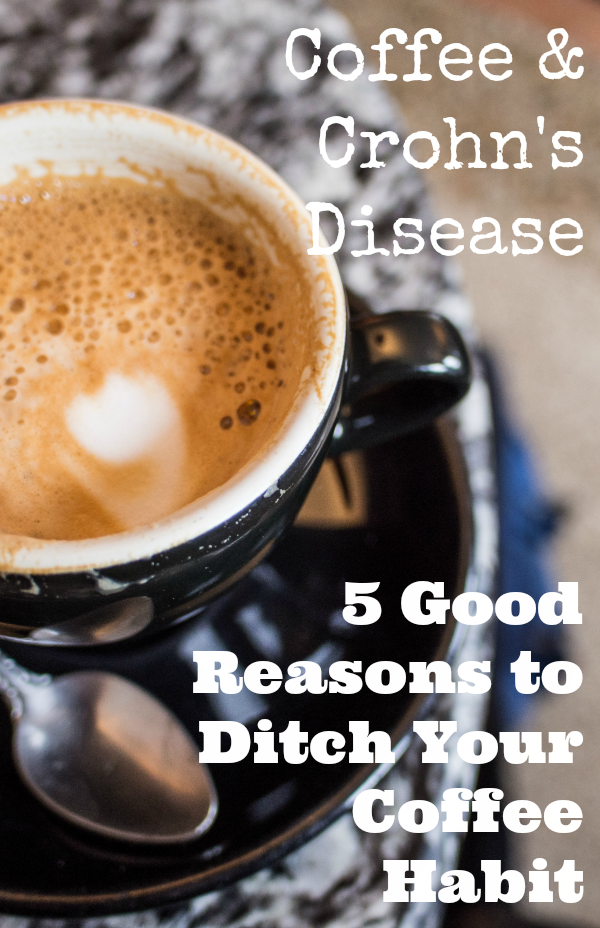
Should you drink coffee if you have Crohn’s disease, ulcerative colitis, or another inflammatory bowel disease (IBD)? I confess, I am a coffee lover who has never been able to give up the habit completely – despite having made big announcements to the contrary! I have successfully taken relatively long breaks from it and I have also gone for periods of time where I cut my consumption back to weekends-only treats, but it has never stuck. Time and again, I return to the seductive aroma, the energizing caffeine buzz, and the comforting warmth of a good cup of java. I tell myself that as long as my Crohn’s disease is under control that I am fine with a cup or two of coffee a day, that it doesn’t aggravate my digestive system, or bother me in any other way.
But lately I have been wondering if I might be deluding myself… Perhaps there are some good reasons for me and for others with IBD to ditch our coffee habits? Indeed, there do seem to be at least five good reasons, starting with the most obvious…
1. Coffee makes you poop.
This fact is so well known that searching for “coffee makes me poop mug” on Amazon returns over 1,000 products! Yes, coffee has a laxative effect, in healthy digestive systems as well as in those with IBD. A 1990 study published in the gastroenterology journal Gut found that coffee induces a “gastrocolonic response” in some individuals just minutes after they consume it. The study didn’t determine an exact cause of this response, but hypothesized that coffee effects the epithelial tissue lining the stomach and small intestine. The researchers also found that coffee promotes the release of gastrin, a hormone produced within the stomach and known to increase motor activity in the colon. The study also looked at decaffeinated coffee and found the same response in some people, so it appears that it is not the caffeine that causes this response but something else in coffee.
While this laxative effect might be humorous to healthy people and even desirable to those dealing with constipation, if you are already prone to loose stools due to active IBD or like me, have had surgery for your disease that has left you with a short bowel, you will not find the joke so funny.
2. Coffee may contribute to a leaky gut.
Even though we call them coffee beans, they are not legumes and therefore coffee is not forbidden on the paleo diet. In fact, the coffee bean is actually a seed, just the same way a grain of wheat is a seed. As Sarah Ballantyne points out in this blog post, seeds contain protective compounds to prevent digestion and thereby ensure the survival of the plant species and these compounds can cause increased intestinal permeability (i.e., leaky gut). These same anti-nutrients can also cause the immune system to exaggerate inflammation and potentially cause autoantibody formation, which is why coffee and other seeds are initially eliminated on the paleo autoimmune protocol (AIP).
Since Crohn’s disease and ulcerative colitis are both conditions that involve the immune system going haywire (there is some debate as to whether or not both should actually be categorized as autoimmune diseases), we should carefully consider whether or not it is a good idea to consume substances that are likely to stimulate the immune system negatively.
3. Coffee might be a gluten cross reactor.
One of the first posts I wrote for this blog was this one on why people with Crohn’s disease should not consume wheat and other gluten-containing grains. Though there is quite a bit of controversy about this topic, some tests do indicate that some people who are sensitive to gluten are also cross-reactive to other substances, including coffee. This means that your body thinks you are consuming gluten when you are consuming these other substances and reacts accordingly.
Although evidence is suggesting that the original tests that put coffee on this list may have been flawed (they used instant coffee that could have been contaminated in processing, not fresh coffee beans), it still seems reasonable to proceed with caution if you have celiac disease, Crohn’s disease, or know you are sensitive to gluten and especially if you have eliminated gluten but are still having symptoms.
4. Coffee affects your body’s ability to deal with stress.
After living with a Crohn’s diagnosis for over two decades now, I am finally realizing that my ability to manage stress is probably the single biggest thing I can do to manage my disease. Much of that has to do with my mental and emotional ability to deal with stress, but there is definitely a physical element as well and it seems that coffee doesn’t help. How so? For one, the caffeine in coffee elevates the stress hormones cortisol, epinephrine, and norepinephrine. These are the hormones that increase your heart rate and blood pressure and divert blood flow away from other bodily functions, like digestion, to prepare your body for “fight or flight.”
Caffeine also decreases magnesium absorption and interferes with GABA receptors. GABA is a neurotransmitter that is naturally produced in the brain and the GI tract and plays an important role in mood and stress management. While you can counter this by taking supplemental magnesium and GABA, perhaps we would be better served by eliminating the source of the problem!
5. Coffee affects your ability to get a good night’s sleep.
Combined with reason #1, for me personally this might be the best reason to cut coffee out of my daily routine. There is nothing sweeter than a good night’s sleep and sometimes I find that elusive, especially since my routine is often disrupted by business travel and a constantly changing schedule. I know that I am sensitive to caffeine and make it an absolute rule that I never drink coffee after mid afternoon, or else I will pay for it with a poor night’s sleep.
By why does this matter so much for people with IBD? There actually is evidence that sleep disturbances can be a potential trigger for a disease flare, as described in this scientific paper published in 2013 in Gastroenterology and Hepatology. The paper authors say that although the exact disease mechanism is not understood, they did find that “sleep deprivation can lead to increased levels of inflammatory cytokines, including interleukin (IL)-1β IL-6, tumor necrosis factor-α and C-reactive protein, which can lead to further activation of the inflammatory cascade.” Now, as a lay person I can’t exactly tell you what that means, but it sounds like a compelling reason to do everything I can to protect my sleep – perhaps even cutting out my beloved morning coffee.
WHINE… But I love coffee!
Fortunately, there are alternatives! My personal favorite is called Sip Herbals, which you can now purchase directly from ShopAIP.

Please sign up for my weekly email newsletter to be the first to know about all my latest offerings and news!
Click to Pin It!

photo credit: ladro cappuccino – seattle-daddycon2014-20140918-P9180034.jpg via photopin (license)



6 replies on “Coffee and Crohn’s Disease: 5 Reasons to Ditch Your Coffee Habit”
Excellent post Jaime! You touched on a few points that I had not thought about! Thank you for sharing! 🙂
Keep us updated on any health benefits you find from reducing coffee!
Have you ever thought that going to the bathroom instead of being constipated with waste build up was better than letting bacteria in the gut thrive and cause damageust to the gut where the waste is stored, waiting to exit the body? If you look at where the damage mostly occurs in the disease you’ll find that more often than not it’s at the ends of both intestines where food and waste collect. Also when the guts are resected the damage seems to come right back where the new healthy tissue is now at the place where the waste and bacteria collect. Just something to think about and that should be studied more, and that drinking coffee to make you go to the washroom is not necessarily that bad. At least you don’t get that bloated feel of constipation caused by narrowing of the guts from swelling and scar tissue caused by the disease if you’re more empty.
Well well. In the middle east and Asia, including Russia where there lives 3+ billion people the most common served drink is Tea. Not coffee. Heard any stomach symptoms from them?… You do the math Einstein.
Can anyone tell me if the recipes for the herbal coffee substitutes are AIP compliant?
[…] gutsybynature.com […]